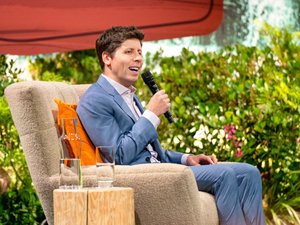
After running for political office and losing twice--once for Congress and a second time for New York City deputy public advocate--Reshma Saujani knows a thing or two about pushing through a challenge.
So when she started to notice the lack of girls pursuing STEM careers while on the campaign trail, she made closing the gender divide in technology her next mission. In 2012, she founded Girls Who Code, an organization with clubs and summer programs around the country that helps get girls engaged in computer science (including 21 chapters in Chicago).
In developing Girls Who Code, Saujani, an Illinois native and UIUC alum, also noticed that girls were more likely to chase perfection than boys, which often led to less risk taking and experimentation. With that in mind, she focused a TED Talk earlier this year on how we need to address the "bravery deficit" that exists among girls if we want ensure they'll be a part of the innovation economy.
In this interview with Chicago Inno, she talks how to tackle this bravery deficit, the importance of developing a computational mindset, and what she would study if she went back to UIUC.
You don't have a coding background, but you started one of the fastest growing coding programs for girls nationwide. How did you go from New York politics to leading a coding initiative?
[I'm a] totally unlikely person to start this organization. I was running for office in 2010 and I saw the gender divide in New York City schools at a time where in New York City we were having a resurgence in tech. When I lost my race I wanted to know where the girls were in technology. There's been a massive decline in the past 30 years at a time when women are the majority consumer base and the customers for many of these startups. So Girls Who Code, really started as an experiment, saying if you build a curriculum that met both where they were at, with project based learning and computational thinking, had girls actually build things that make them into social entrepreneurs, what would happen? Could you increase girls in computer science? We've grown to reach about 40,000 girls in all 50 states by the end of this year.
A lot of coding initiatives come from people with a CS background, who are working in the space, but you come from a political background. How does that background interact with advocating for the STEM field?
I feel like I am one of the girls that should have majored in computer science, but I was terrified of math and science growing up. I feel like culture and all the messages that were coming at me, I listened to them. So I think I represent the millions of girls that we're trying to reach, that we're trying to get to go into computer science.
I feel like I am one of the girls that should have majored in computer science
Second, I come at it from an economic perspective. There's 1.4 million jobs open in this space, you can make $120,000 per year as a software engineer, 71 percent of all STEM jobs are in CS, and at a time when women will soon make up the majority of breadwinners in this country. Why don't we have the high paying jobs? So for me, solving this problem is an important domestic issue.
Some people say there isn't enough emphasis on creating a computational mindset in coding programs, which is important for architecting that next generation technology. Can you talk about how you developed Girls Who Code with that in mind, and talk to people who aren't convinced a summer program will make a difference?
From the beginning, we've had a philosophy around computational thinking and not having girls just regurgitate computer languages. And I think one of the reasons why for a lot of girls AP computer science exam is not attractive is because it feels like it's just that, and it's not about teaching girls how to solve a problem. I think if you teach girls computational thinking then whatever languages come out in the next five, ten, fifteen years girls will be able to master.
Our summer program is a seven week intensive, everyday, 9 to 5. It's basically the equivalent of a half a semester in college. We say in 7 weeks you can teach a girl the fundamentals of computer science and get her prepared to do well in a first year computer science program in college where the drop out rate for women is almost as high as 48 percent. I think that's where Girls Who Code distinguishes ourselves. It's not about tinkering. We produce female software professionals. And I think our programs are really rigorous.
You're also a big believer that we need to change the "culture" around tech, to make it friendlier to women. But that's easier said than done. How do you create actionable steps toward changing something as nebulous as "culture"?
We believe in infiltration. It's about teaching as many girls as possible, putting them in the pipeline so you can actually increase the amount of technical women at these companies. Secondly we build classrooms in technology companies, so both men and women get experience educating them on the issues. We have allies. I've had men who work with Girls Who Code who said 'I didn't even know how to work with women.' So I think they get experiences and they get bought into the movement. Some of our biggest supporters are male allies.
Another thing we do is build sisterhood. One of our girls in our summer program, after she did the summer program she went back to her school and they started a Girls Who Code club. The school was going to hire a computer science teacher, and the girls advocated that the computer science teacher was a woman. Teaching girls to do that type of advocacy in their schools, in their colleges and then in their companies is going to make a massive difference.
The school was going to hire a computer science teacher, and the girls advocated that the computer science teacher was a woman
Similarly, in a recent TED talk, you said there is a "bravery deficit" among women, which also impacts their interest in computer science and entrepreneurship. How do you tackle a deficit in bravery?
You tackle it in the schools, you tackle it as parents, you tackle it as women. It's about getting girls comfortable with imperfection. It happens at a very young age. I don't know about you, but from the beginning I was scared of doing a cartwheel, so I thought I was horrible at gymnastics. Then I regret not being able to do a cartwheel, I think if I did it all over again and my parents made me stick with gymnastics I might be at the bottom 10 percent at but I'm continuing to do it, and I think its little things like that.
You recently had a son, Shaan. Has raising a son impacted your view of bringing men into the conversation around encouraging women in STEM and entrepreneurship?
My life was about girls, and I always I think the universe gives you what you need. I do think my eyes have opened up to the way we raise our boys and the way we socialize our boys and the opportunities that Shaan may have, and raising him as a feminist, and exposing him to issues, and teaching him to be kind and humble.
You grew up in Schaumburg and studied political science at UIUC, which is one of the top CS and engineering schools in the country. How did that time play into your current work with Girls Who Code?
I missed it all. I was at the U of I when all these innovations were happening on the Internet, and I was totally not aware of it. If I had a do over, I would have majored in poli sci and computer science. I did the commencement speech last year [and] it was really interesting talking to a lot of the professors. Now computer science at U of I is oversubscribed, and they've been doing all these [multidisciplinary] programs, so you can do a CS and poli sci major, or CS and art programs. They're thinking about how to make things multidisciplinary.
Image credit: Girls Who Code








